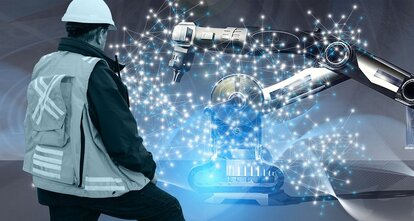Technology
Artifical Intelligence Enters a New Era

Chatgpt
© PixabayArtificial intelligence is all the rage. It was already starting to be so in the summer of 2022, but the subsequent irruption of generative artificial intelligence has multiplied the expectations, opportunities and possible uses of the technology. In many ways, 2023 can be considered the year of artificial intelligence on the planet.
The continuous development of digital technologies and their combination in business, residential and social applications and solutions is digitising the economy and society. Artificial intelligence, which enhances its possibilities with the help of other technologies such as big data, data analytics, Internet of Things, 5G or blockchain, is starting to be at the heart of the new stages of digitalisation, generating numerous opportunities and posing ethical, regulatory and employment challenges that should not be forgotten.
Today, artificial intelligence makes it possible to add a layer of intelligence to all kinds of products, services and processes. Thus, it is possible to find fully operational applications in all kinds of sectors, such as industry and maintenance, transport, health and medicine, justice and insurance, entertainment, environment and sustainability, financial services, retail, marketing and advertising, social networks or public and local administrations.
On many occasions, users (companies or citizens) are aware of the presence of technology, while on other occasions, it goes unnoticed, as it operates in the background in websites, applications, messaging, searches, digital tools, etc.
Artificial intelligence is transforming the economy and society in all parts of the world, although its importance and practical results are often in line with the economic and technological development of individual countries. As a result, a significant gap remains between many of them.

Using the percentage of business adoption of artificial intelligence, big data and the Internet of Things as an indicator (Economist Impact and Lenovo Smart Transformation Index, 2023[1]), the leading countries in this area are Denmark, Finland and the United States. The Top 10 is occupied by nine European countries plus the United States, while China ranks 15th and Japan 17th. Looking at other continents, Australia is ranked 32nd and Brazil 26th. From position 20 onwards, the index value is less than half that of the leader in the ranking (Denmark), confirming the significant gap.
According to the same index, which includes 33 states, the Mediterranean countries are represented by France, Italy, Spain and Greece, which occupy positions between 16 and 22 in the ranking, and by Turkey (position 27) and Israel (position 33). No African country appears in the index.
Another analysis[2], this time carried out by the Valencian University Institute for Research in Artificial Intelligence (VRAIN) of the Universitat Politècnica de València, analyses the impact of artificial intelligence in the countries of the so-called Mediterranean Arc. This Arc is made up of 11 countries in southern Europe, five in northern Africa and seven in western Asia.
The VRAIN study is based on the existence of a correlation between the returns on artificial intelligence activity and the scientific output in this area, measured in scientific publications. The document shows the importance that the technology will have in the countries of the Mediterranean Arc, as well as its benefits in areas such as health, meteorology, the environment, the elderly, education and the public sector.
According to the study, the number of companies in the Mediterranean Arc that have already adopted digital technologies is very low and in some countries none are using them at all. As in other regions of the world, this situation is more pronounced in Mediterranean SMEs, despite the undoubted advantages of technology and the improved performance of companies that already use it. The low level of adoption contrasts with the significant impact that artificial intelligence would have on the Mediterranean Arc if it were applied with the necessary ethical, social and cultural values. This impact should be translated into concepts such as security, sustainability, democracy, participation, transparency and accountability.
[1] https://impact.economist.com/perspectives/technology-innovation/intelligent-transformation-index
[2] https://geomett.com/el-impacto-de-la-inteligencia-artificial-en-los-paises-del-arco-mediterraneo/

In addition, the VRAIN study includes a decalogue of recommendations for the Arc. The creation of a network of centres that facilitate the transfer of knowledge, the establishment of a system of aid that makes it possible for research staff and students to stay in the centres, support for the implementation of technology in the most disadvantaged countries and the promotion of training in this area are some of them.
The review of scenarios and trends in regions with a significant weight of developing countries, such as Latin America[1], raises conclusions and recommendations that converge with those of the Mediterranean Arc. To boost the development of artificial intelligence in this profile of regions, it is necessary to strengthen educational systems, foster cross-border collaboration and generate regional data repositories, expand regional cooperation in governance and research, advance in regulation, promote developments based on the unique characteristics of the region or stimulate the use of artificial intelligence oriented towards social challenges.
These last two points are very important because they can help to bring the Mediterranean community together on the technological side and make society and businesses in the geographical area demand and support the development of technology. Some real cases, such as the use of a group of underwater robots with artificial intelligence to monitor the most vulnerable ecosystems in the Mediterranean or the detection of massive algae proliferation in this sea by analysing satellite images using algorithms, show the potential of technology in the region for monitoring and solving problems of concern to society.
Artificial intelligence is transforming the Mediterranean Arc and will continue to do so, which is why it is necessary to regularly assess progress, implement recommendations and set determined strategies to accelerate its development for the benefit of all citizens, companies and institutions living and working on the shores of the Mediterranean Sea.
[1] https://indicelatam.cl/wp-content/uploads/2023/08/ILIA-2023.pdf
